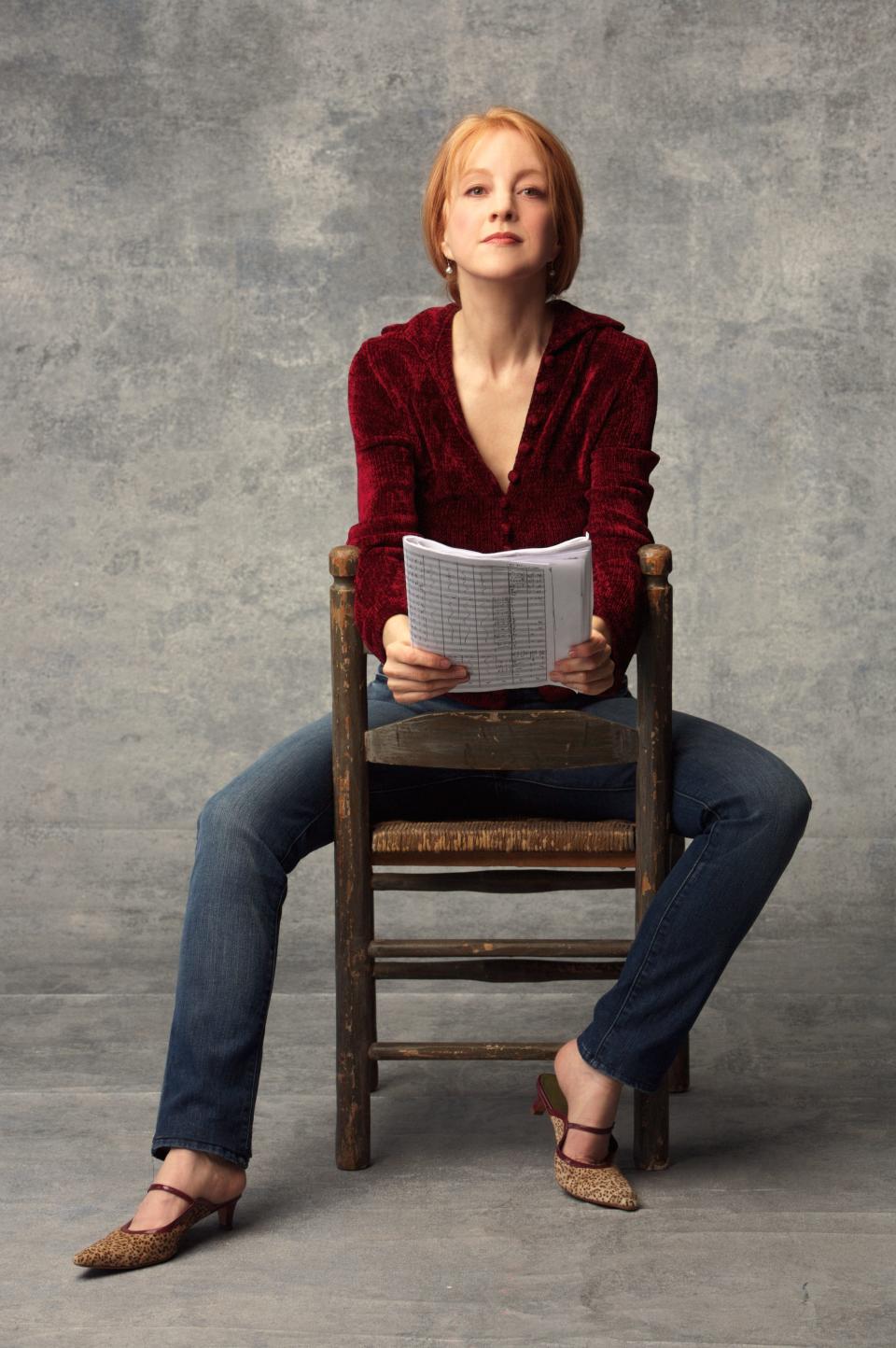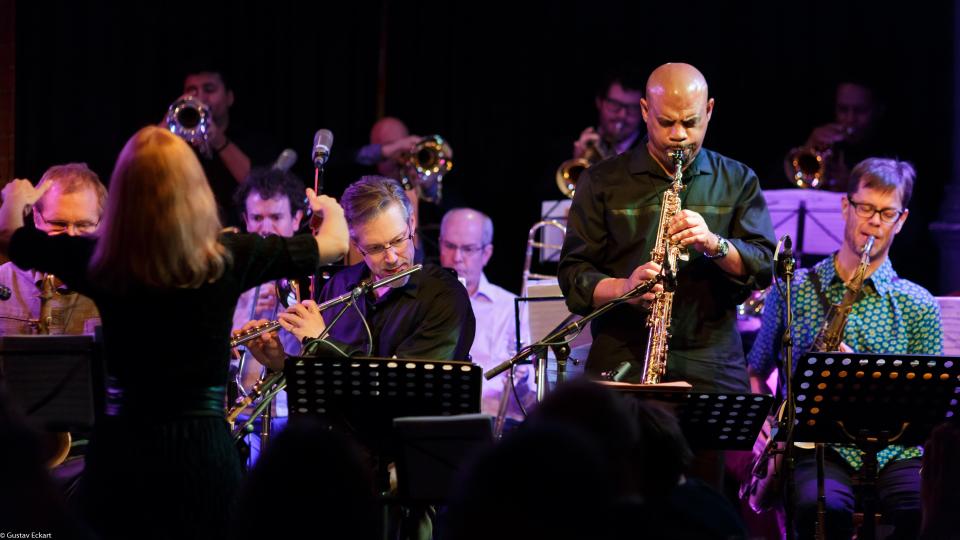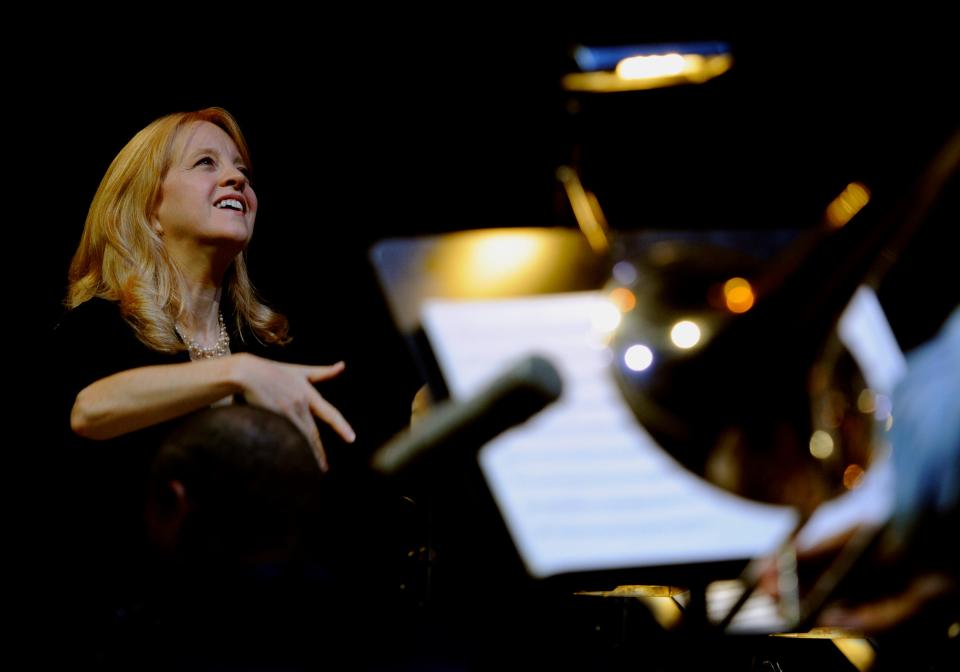Grammy favorite Maria Schneider Orchestra bringing innovative jazz to Columbia series
- Oops!Something went wrong.Please try again later.
Maria Schneider cares not only that people listen, but how they listen.
The seven-time Grammy winner and Pulitzer Prize finalist wholly gives herself to the belief that listening is an art form. She wants audiences to invest their precious sensory attention in the music she writes for her innovative jazz orchestra, with all its nuanced motion and grand melodic gestures.
But the Minnesota native also craves the sort of generous listening that binds us together on and off the bandstand. When she and her musical mates exercise this intimate skill, the audience knows.
"They can literally see and hear that connection between everybody in the band, that powerful listening," she said over Zoom this week.
Columbia music lovers will have the chance to practice this power alongside the composer and bandleader when the Maria Schneider Orchestra plays the "We Always Swing" Jazz Series next weekend.

A musical conversation
Schneider's orchestra doesn't simply exist at the intersection of jazz and symphonic music; rather, it clears whole city blocks, making room for the sound. Think Gershwin-esque rhapsodies in blue — and every other Technicolor tint — if the American giant had a full 20th century, and early 21st, of popular music to draw upon.
In Schneider’s work, the pendulum’s swing is as natural as breathing: from beautifully deliberate compositions to vibrant, improvised moments; textured ensemble passages that give way to solos played beneath spotlights.
Such a sustained and dynamic musical undertaking requires fellow artists with reflexive talents, brilliant voices wiling to merge with the mix.
“You want people that absolutely find joy in blending ... they love making the ensemble sound great,” Schneider said.
Again invoking the nature of conversation, she said orchestra members can’t sit around all night counting measures till their solo — the musical equivalent of waiting for someone to finish talking so you might hear yourself — but cherish their time spent listening, and taking the music as it comes.

Schneider wants the music she composes, and the orchestra then interprets, to sound “inevitable,” as if it couldn’t arrive another way. For this to happen, players must internalize, then express “something that rises above the music,” a kindred motivation.
“I can’t demand it, because I’m asking them to put in something I haven’t conceived of,” Schneider said.
This reality eventually yields little ecstasies; in the composition process, it throws down challenges.
“You’re trying to imagine what somebody might do; you’re trying to leave it open so that they can be themselves,” Schneider said. “Yet you want to build in this sense that there is going to be this inevitable landing.”
When Schneider and the orchestra stick the landing together, audiences are unable to tell where the improvisation begins and ends, she said. And, in this, the music certainly resembles what Schneider wrote but takes on fresh color and meaning.
“At the end of the performance, what we create in that moment — that isn’t ever recreated exactly the same again, sometimes not even remotely the same again — that thing we create is ours,” she said.
From 'Evanescence' to thoughtful vigilance
Schneider cracked open this great conversation 30 years ago with her first record, 1994’s “Evanescence.”
An “impressive” debut, the arrangements therein were “often dense, a bit esoteric, and thought-provoking,” noted jazz scribe Scott Yanow wrote for AllMusic.
Counting all the notes since, Schneider recalled experiencing a serious concern she’d have enough energy to write a second record.
“I’ve always doubted, and I continue to doubt” after each album cycle, she said.

But Schneider owns 30 years’ worth of testimonies — that the breakthroughs keep, well, breaking through.
And her work hits higher, more complex notes with time. “Data Lords,” which played its way onto the Pulitzer radar, represents “an uncharacteristically brackish and turbulent piece” that grapples with the composer’s long-held concerns over the intrusion and isolation wrought by Big Tech, NPR’s Nate Chinen wrote.
“On the whole and in the details, it amounts to the most daring work of Schneider's career, which sets the bar imposingly high,” Chinen added. “This is music of extravagant mastery, and it comes imbued with a spirit of risk.”
The 2020 album exists as a high-water mark, and a natural extension of dialogues Schneider has brokered for decades.
She is, Chinen wrote, “one of the music world's most prominent critics of copyright abuse and unfair revenue structures in the streaming age”; and remains passionate about artists retaining their rights and everyday citizens controlling their own data points.
Schneider's music, especially on the "Data Lords" record, worries over the junk we send into space and the junk which clutters our soul. Burrowing so deep into the digital world, she said, we lose our taste for enjoy challenging discourse, letting our minds be changed rather than living on-guard.
This moment brings particular import to the live-music experience, to listening and connecting in real time. Schneider typically asks venues to keep the lights up enough for her orchestra to make out the faces they're playing to; this sort of exchange is expressed simply but hard-won.
"Human connection," Schneider said with a clear exclamation point in her voice.
Maria Schneider Orchestra performs at 7 p.m. Feb. 25 at the Missouri Theatre; tickets are $15-$49. Visit https://www.wealwaysswing.org/season/2023-2024/ for more details.
Aarik Danielsen is the features and culture editor for the Tribune. Contact him at adanielsen@columbiatribune.com or by calling 573-815-1731. He's on Twitter/X @aarikdanielsen.
This article originally appeared on Columbia Daily Tribune: Grammy-winning Maria Schneider Orchestra will perform in Columbia

